On this page
1. Introduction
The Workforce Disability Equality Standard (WDES) programme was established in 2019. It requires organisations to report against ten indicators of disability equality and supports continuous improvement through robust action planning to tackle the root causes of discrimination.
Inequalities in any form are at odds with the values of the NHS. Research shows that the fair treatment of our staff is directly linked to better clinical outcomes and better experience of care for patients.
This report represents the fourth publication since the WDES was established. There are some very positive findings in this report and there are also areas where further analysis of the information is required to fully understand the results.
The Trust is committed to tackling disability discrimination to bridge the gaps in experience, opportunity and differential attainment in our diverse workforce. A key tool to understanding and correcting these inequities is the presentation of detailed data to key work streams, which will allow us to identify the targets for action.
2. WDES Indicators 2022
A summary of the results for North Tees and Hartlepool NHS Foundation Trust is shown in the table below. This includes comparison of the Trust’s results covering a four-year period (2019 to 2022). The baseline data has been extracted from ESR, Workforce databases and the Trac recruitment system to calculate a response to each of the ten WDES indicators.
| No. | WDES Indicators 2022 | Type | 2019 | 2020 | 2021 | 2022 |
|---|---|---|---|---|---|---|
| 1 | Percentage of staff with a disability or long term health condition | Overall | 2.0% | 2.0% | 2.0% | 3.0% |
| Non-clinical | 2.0% | 2.0% | 2.0% | 3.0% | ||
| Clinical | 2.0% | 2.0% | 2.0% | 3.0% | ||
| 2 | The relative likelihood of Disabled staff being appointed from shortlisting compared to Non-Disabled staff | 1.64 | 1.34 | 0.94 | 0.98 | |
| 3 | The relative likelihood of Disabled staff entering the formal capability process compared to Non-Disabled staff | 0 | 0 | 0 | 0 |
| No. | WDES Indicators 2022 | Types | 2018 | 2019 | 2020 | 2021 |
|---|---|---|---|---|---|---|
| 4a | Percentage of staff experiencing harassment, bullying or abuse from patients, relatives or the public in the last 12 months | Staff with a disability or LTC | 35.4% | 35.5% | 29.6% | 28.6% |
| Staff without | 26.7% | 27.8% | 24.1% | 26.3% | ||
| 4b | Percentage of staff experiencing harassment, bullying or abuse from manager in the last 12 months | Staff with a disability or LTC | 16.3% | 14.2% | 18.3% | 14.2% |
| Staff without | 5.8% | 7.3% | 7.5% | 7.6% | ||
| 4c | Percentage of staff experiencing harassment, bullying or abuse from other colleagues in last 12 months | Staff with a disability or LTC | 33.7% | 21.5% | 23.4% | 19.9% |
| Staff without | 12.4% | 14.7% | 13.8% | 13.3% | ||
| 4d | Percentage of staff saying that the last time they experienced harassment, bullying or abuse at work, they or a colleague reported it | Staff with a disability or LTC | 51.2% | 45.9% | 54.3% | 46.2% |
| Staff without | 52.9% | 46.3% | 47.3% | 47.3% | ||
| 5 | Percentage of staff who believe that their organisation provides equal opportunities for career progression or promotion | Staff with a disability or LTC | 54.0% | 59.3% | 54.3% | 57.6% |
| Staff without | 67.0% | 63.8% | 62.6% | 65.5% | ||
| 6 | Percentage of staff who have felt pressure from their manager to come to work, despite not feeling well enough to perform their duties | Staff with a disability or LTC | 43.8% | 35.7% | 39.0% | 27.8% |
| Staff without | 19.2% | 24.0% | 24.9% | 21.0% | ||
| 7 | Percentage of staff satisfied with the extent to which their organisation values their work | Staff with a disability or LTC | 36.7% | 40.7% | 36.9% | 37.4% |
| Staff without | 53.4% | 54.1% | 53.3% | 47.6% | ||
| 8 | Percentage of staff with a long lasting health condition or illness saying their employer has made adequate adjustment(s) to enable them to carry out their work | Staff with a disability or LTC | 66.7% | 77.4% | 74.2% | 74.1% |
| 9 | Staff Engagement Score (0-10) | Staff with a disability or LTC | 6.50 | 6.7 | 6.7 | 6.6 |
| Staff without | 7.2 | 7.3 | 7.3 | 7.1 | ||
| Overall | 7.1 | 7.2 | 7.1 | 6.9 |
| No. | WDES Indicators 2022 | Type | 2019 | 2020 | 2021 | 2022 |
|---|---|---|---|---|---|---|
| 10 | Disabled/LTC Board Membership | 0.0% | 0.0% | 0.0% | 7.1% |
3. Key findings for 2022
The key findings in respect of the ten WDES i ndicators for 2022 are summarised below.
We are currently only able to undertake benchmarking for those areas which relate to the staff survey (indicators 4-9). Full benchmarking information is published by the national WDES team and this is expected for March 2023.
Indicators 1 and 10 – Percentage of staff with a disability or long term health condition
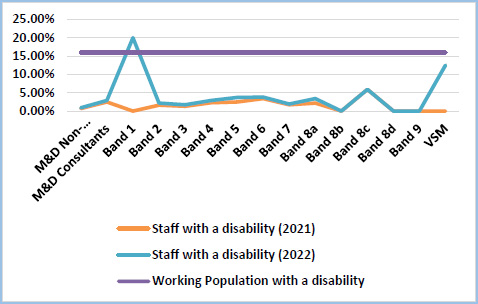
Representative Workforce across all protected characteristics at all levels
There has been a positive increase in the number of staff who have reported their disability status on ESR – an increase from 2% to 3%. This is a result of a targeted staff campaign, which included development of a user guide illustrating how to complete an online self-declaration.
Representation of staff with a disability or long-term condition is significantly lower than the disabled adult working population (3% as compared to the national figure of 16%) and it is expected that the true figure is much higher than that currently reported.
Representation of Disabled staff at Board and senior management levels
For the first time, we have reported disability representation at Board level. This is currently reported as 7.1% which is higher than the overall workforce figure of 3%. We have also seen a positive increase at Bands 8a, 8c and VSM.
Over 50% of Board Members have not declared their disability status.
Indicator 2 – The relative likelihood of Disabled staff being appointed from shortlisting compared to Non-Disabled staff
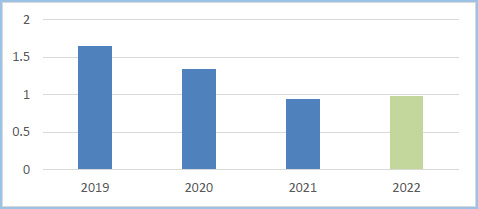
Equity of Experience
Shortlisted disabled applicants continue to be more likely to be appointed following shortlisting than non-disabled applicants.
This is a continued improvement on previous years, and is close to achieving the required ratio of 1.0 (currently reported as 0.98).
A total of 167 applicants with a declared disability were shortlisted, of which 51 individuals were successfully recruited.
Indicator 3 – The relative likelihood of Disabled staff entering the formal capability process compared to Non-Disabled staff
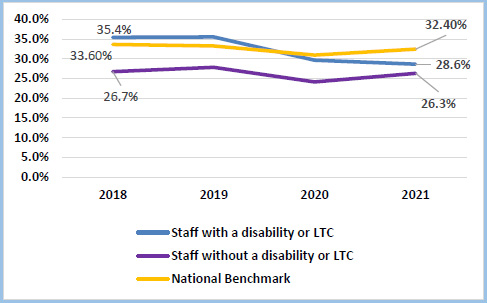
Equality of Experience
There have been no formal capability cases involving staff with a declared disability or long-term condition, therefore it remains the case that staff without a disability are more likely to enter a formal capability process.
There was one individual who had not declared their disability status, which is potentially a missed opportunity where consideration of reasonable adjustments could have taken place and formed part of the supportive development plan.
Whilst we are not required to declare the number of informal cases, we have reviewed this information and again there are no individuals with a recorded disability or longterm condition, however there are 3 individuals with an undeclared status.
Indicator 4a – Percentage of staff experiencing harassment, bullying or abuse from patients, relatives or the public in last 12 months

Staff Survey Key Findings – B&H Public
This information has been obtained from the 2021 Staff Survey results.
The results show a further reduction in the number of disabled staff who have experienced harassment, bullying and abuse from patients, relatives/public (28.6% compared to 29.6% in 2020).
Staff with a disability/LTC continue to be more likely to experience harassment, bullying/abuse from patients than staff who do not have a disability, although the gap continues to narrow and the gap for 2021 is reported as 2.3%.
The national benchmarking data for 2021 indicates that 32.4% of disabled staff have experienced harassment and abuse from patients, which is 3.8% higher than the Trust figure.
Staff are required to log all incidents of service user violence and harassment via Datix and the information is reported through Yellowfin. The Trust’s Keeping People Safe group reviews this information on a regular basis to identify trends and this includes analysis of related themes.
Indicator 4b – Percentage of staff experiencing harassment, bullying or abuse from manager in last 12 months
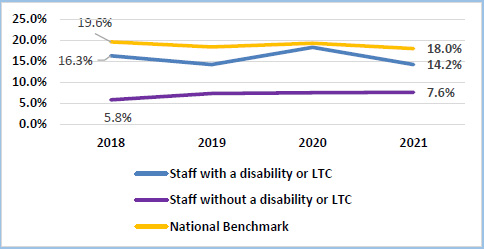
Staff Survey Key Findings – B&H Manager
Staff survey results show a reduction in the number of disabled staff experiencing harassment, bullying and abuse from a manager (14.2% compared to 18.3% in 2020).
Staff with a disability/LTC continue to be more likely to experience harassment, bullying/abuse from a manager than staff who do not have a disability, although the gap has narrowed for 2021 and this is currently reported as 6.6%.
The national benchmarking data for 2021 indicates that 18% of disabled staff have experienced harassment and abuse from their manager, which is 3.8% higher than the Trust figure.
Indicator 4c – Percentage of staff experiencing harassment, bullying or abuse from other colleagues in last 12 months
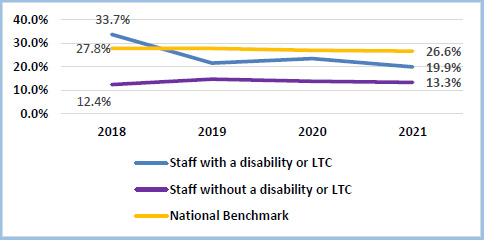
Staff Survey Key Findings – B&H Colleagues
Staff survey results show a decrease in the number of disabled staff experiencing harassment, bullying and abuse from a colleague (19.9% compared to 23.4% in 2020).
Staff with a disability/LTC continue to be more likely to experience harassment, bullying/abuse from a colleague than staff who do not have a disability, although the gap has narrowed for 2021 and this is currently reported as 6.3%.
The national benchmarking data for 2021 indicates that 26.6% of disabled staff have experienced harassment and abuse from colleagues, which is 6.7% higher than the Trust figure.
Indicator 4d – Percentage of staff saying that the last time they experienced harassment, bullying or abuse at work, they or a colleague reported it
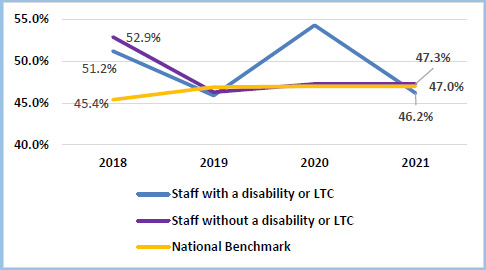
Staff Survey Key Findings – Reporting
Staff survey results show a significant (negative) reduction in the number of disabled staff who have reported harassment, bullying and abuse (46.2% compared to 54.3% for 2020).
Staff with a disability/LTC are marginally less likely to report harassment, bullying/abuse than staff who do not have a disability, with a reported gap of 1.1%.
The national benchmarking data for 2021 indicates that 47% of disabled staff have reported harassment and abuse, which is 0.8% higher than the Trust figure. It is important that staff are encouraged to report concerns regarding bullying and harassment and all cases are logged and monitored by the Workforce Team. Work is ongoing to understand why the number of formally reported cases is lower than the staff survey results would suggest.
Indicator 5 – Percentage of staff who believe that their organisation provides equal opportunities for career progression or promotion
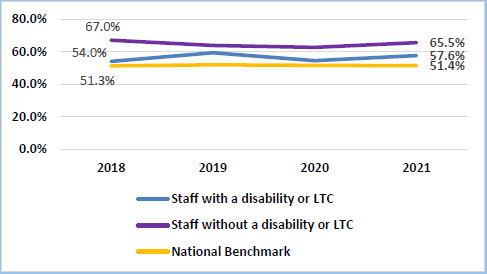
Staff Survey Key Findings -Equal Opportunities
Staff survey results show a slight increase in the number of disabled staff who believe the organisation provides equal opportunities for career progression or promotion (57.6% compared to 54.5% for 2020).
Staff with a disability/LTC continue to be more likely to report lower levels of equal opportunities than staff who do not have a disability, with a reported gap of 7.9%.
The national benchmarking data for 2021 indicates that 51.4% of disabled staff believe their organisation provides equal opportunities for career progression, which is 6.2% lower than the Trust figure.
The national team have developed an interactive tool for 2021 to allow for analysis of this metric at a more detailed level, including comparison with other protected characteristics, department and staff group.
Indicator 6 – Percentage of staff who have felt pressure from their manager to come to work, despite not feeling well enough to perform their duties
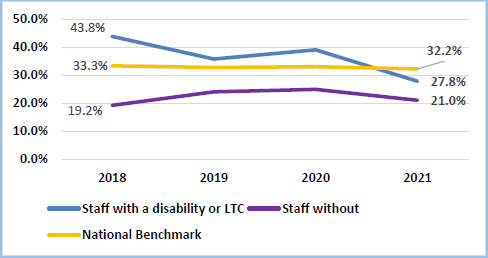
Staff Survey Key Findings -Attendance at work whilst unwell
Staff survey results show a significant reduction in the number of disabled staff who have felt pressure from their manager to come to work whilst unwell (27.8% compared to 39% for 2020).
Staff with a disability/LTC continue to be more likely to report pressure to attend work whilst unwell than staff who do not have a disability, although the gap has narrowed for 2021 and this is reported as 6.8%.
The national benchmarking data for 2021 indicates that 32.2% of disabled staff have felt pressure to attend work, which is 4.4% higher than the Trust figure.
Indicator 7 – Percentage of staff satisfied with the extent to which their organisation values their work
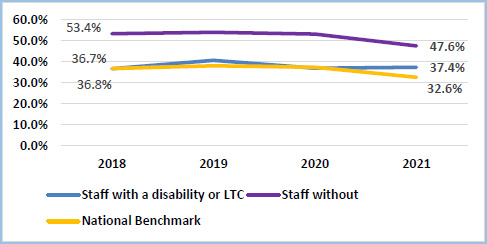
Staff Survey Key Findings – Feeling Valued
The number of disabled staff who feel satisfied that the organisation values their work has marginally increased for 2021 (37.4% compared to 36.9% for 2020).
Whilst this is only a small increase, it is a positive outcome as the trend for non-disabled staff has seen a reduction for this indicator and this is also the same at a national level for disabled staff.
Staff with a disability/LTC continue to be less likely to feel valued than staff who do not have a disability, although the gap has narrowed for 2021 and this is reported as 10.2%.
The national benchmarking data for 2021 indicates that 32.6% of disabled staff feel valued by their organisation, which is 4.8% lower than the Trust figure.
Indicator 8 – Percentage of staff with a long lasting health condition or illness saying their employer has made adequate adjustment(s) to enable them to carry out their work

Staff Survey Key Findings – Reasonable Adjustments
Staff survey results remain static in terms of the number of disabled staff who have reported that the Trust has made adequate reasonable adjustments to enable them to carry out their work (74.1% compared to 74.2% for 2020).
The Attendance Management Policy has been reviewed and enhanced in 2022 to include additional guidance for managers in respect of equality and diversity and consideration of reasonable adjustments, and this includes templates for documented agreements, which encourage positive discussions to support staff.
The national benchmarking data for 2021 indicates that 70.9% of disabled staff have reported that their manager has made adequate adjustments, which is 3.2% lower than the Trust figure. The trend at a national level has remained static for the previous three years, with a reduction in 2021 therefore it is encouraging that the Trust has been able to maintain our score in this area.
Indicator 9 – Staff engagement score (0 -10)
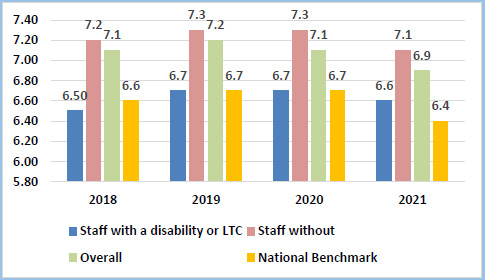
Staff Survey Key Findings – Staff Engagement
Staff survey results show that the staff engagement score for disabled staff remains broadly the same as the previous year at 6.6.
Staff with a disability/LTC continue to be more likely to report lower levels of staff engagement than staff who do not have a disability. However, it is positive that we have been able to retain this score for 2021, as it can be seen that the engagement score for non-disabled staff has reduced from 7.3 to 7.1 and for the overall workforce it has reduced from 7.1 to 6.9.
The national benchmarking data for 2021 indicates that the engagement score for disabled staff is 6.4, which is 0.2 lower than the Trust figure. The national figure has seen a reduction of 0.3 since 2020, whereas the Trust reduction was lower at 0.1.
4. Conclusion and Next Steps
The Trust is committed to meeting the requirements of the Workforce Disability Equality Standard for NHS Trusts and this is our fourth publication against the standard.
Our actions to improve the Trust’s WDES Indicators (2022) align with the Trust’s wider organisational strategic goals, specifically ‘Valuing our People’. They also support our commitments to the NHS People Plan and the People Promise: ‘We are recognised and rewarded’.
By taking action to improve the experience of our disabled colleagues, we aim to support the organisation to be an employer of choice; an outstanding place where people want to work and are proud to work, and somewhere which provides equality for everyone.
Our culture is shaped by the actions that we take and we continue to implement a number of programmes/activities to promote and support disability equality in the workplace. Some of these actions/activities are detailed below:
The Trust’s Ability staff network continues to offer staff a place where they can come together, share experiences and facilitate learning and development. The network will also assist in the shaping and delivery of organisational strategy and policy, working with us to improve staff experience on specific disability related issues and adding more depth to our WDES Action Plan. The network has developed a monthly newsletter which is distributed to all staff and we have invited various organisations to speak at the network such as Access to Work and Project Choice.
- All of our staff networks (BAME, Disability, LGBTQ+, Women, Men, Age, Multi-faith) aim to:
- Promote equal rights and opportunities;
- Pro-actively tackle discrimination or disadvantage in all its forms;
- Create an open and inclusive culture where equality, diversity and inclusion can be comfortably discussed;
- Encourage our staff to have a voice in the organisation – to share their experiences so that we can listen and act on staff feedback.
- Our workforce Disability Awareness event took in November 2021, where members of the Ability staff network recorded a series of videos which were promoted across the Trust to highlight the experiences of our disabled staff. Members of the network also took the opportunity to visit a number of clinical areas to raise awareness of disabilities and promote the network as a place to receive support.
- A campaign took place to encourage staff to complete their disability declaration on ESR to ensure that we are able to accurately report on our workforce profile. This included development of a user guide which was issued to all employees via our communications bulletins. This has had a positive impact in the numbers of staff who have declared a disability, but it has also helped to reduce the numbers of staff with an undeclared status.
- We were accredited by the Disability Confident Scheme as a Level 2 Disability Confident Employer in 2021 in recognition of our commitment to disabled workers. Our application was endorsed by members of the Ability staff network and we are planning to apply for Level 3 Disability Confident Leader status in 2022/23.
- The Trust’s Attendance Management Policy was reviewed and enhanced in 2022 to include additional guidance for managers in respect of equality and diversity considerations and guidance for making reasonable adjustments. This included the implementation of a structured template aimed at promoting positive discussions to support staff in relation to reasonable adjustments, with a documented agreement which sets out both the manager and employee commitments.
- As a fair and equal employer, we appoint the best candidates during our recruitment campaigns regardless of disability or any other protected characteristic.
- As part of our commitment to embedding Values Based Recruitment, we are implementing a structured interview template, which aims to ensure that every candidate has an equal chance for promotion/employment through the use of consistent measures.
- We have appointed a Champion of Flexible Working and a Health and Wellbeing Guardian in line with our responsibilities under the People Plan
- We continue to embed and grow the Cultural Ambassador programme within the Trust and a cohort of four individuals have completed their training in April 2022. The skills of the Cultural Ambassador are transferable to all areas of equality and it is expected that this will also have a positive impact in terms of identifying and ‘calling out’ disability related bias.
- We actively analyse our staff survey data from a disability perspective by comparing the experiences of our disabled and non-disabled staff. The themes of bullying, harassment and abuse from patients, managers and colleagues, belief in equal opportunities for career progression, pressure to attend work whilst unwell, feeling valued, adequate reasonable adjustments and overall staff engagement form part of the WDES metrics (indicators 4-9). The NHS Survey Co-ordination Centre has developed a new interactive tool for 2022 which for the first time, will allow us to examine this data at a more detailed level, i.e. by staff group and comparison with other protected characteristic groups.
We take disability equality seriously and whilst we have already implemented a number of practices which will have a positive impact in this area, we understand that change will require a significant cultural shift within the organisation. We know that our workforce disability profile is under reported and this will not change overnight, however we are starting to see a gradual increase in the number of staff choosing to declare their disability status. It is also important that we continue to grow the membership of our Ability staff network to help us facilitate the voices of our disabled staff and improve staff experience.
A robust action plan has been put in place for 2022/23 which is outlined in appendix 1.
We will continue to promote the activities and good practice that we already undertake, including undertaking fair and transparent recruitment processes, delivery of unconscious bias training and promotion of various leadership and development opportunities which exist across the Trust.
We need to consider how this is incorporated into our engagement strategy and how we can improve our communication around both the data for the Trust and what we are doing in response to this. This will be considered as we enter Phase 2 of the Equality, Diversity and Inclusion review and this will inform how we continue to improve as a Trust.
Appendix 1
Primary author(s) of this Action Plan
Nicola Hogarth, Employee Relations Advisor Elizabeth Morrell, Employee Relations Manager
Plan endorsed by
Equality and Diversity Steering Group
Sources of information underpinning the plan
- Staff Survey data
- Electronic Staff Records (ESR) data
- Ability Staff Network
- People Group Reports
Actions around WDES Indicator 1: Recruitment
Improve monitoring data for recruitment and selection and career progression for Disabled applicants (New).
- Improve monitoring data for recruitment and selection and career progression for Disabled applicants (New).
- Improve monitoring data for recruitment and selection and career progression for Disabled applicants (New).
Undertake a review and refresh of the Trust’s Recruitment training to raise awareness of EDI and unconscious bias (New).
- A new recruitment training package is to be rolled out during Q4, 2022/23. All interview panels must have at least one trained representative.
- A new recruitment training package is to be rolled out during Q4, 2022/23. All interview panels must have at least one trained representative.
Implement a reciprocal mentoring scheme with the aim of increasing representation for disabled staff across all levels of the organisation (New).
- Implement a reciprocal mentoring scheme with the aim of increasing representation for disabled staff across all levels of the organisation (New).
- Participants to provide feedback on the scheme to ensure continuous development and ensure this meets the needs of staff.
Participate in the Scope for Growth programme delivered by NHS England, to ensure ongoing reflection, conversation, and development.
- Pilot to commence October 2022.
- Participants to provide feedback on the programme (both staff and managers). Review of development plans.
Scope for Growth is designed to provide a framework for high-quality career conversations that help draw out an individual’s aspirations as well as their potential (New).
- Additional timescales to be defined as part of the project plan.
- Future monitoring of career development as a result of Scope for Growth.
Implement audits in relation to recruitment data to identify numbers of applicants who are part of the Guaranteed Interview Scheme.
- Audits scheduled to commence Q4, 2022/2023.
- Reporting to continue on a quarterly basis. Discussions will identify themes, concerns resulting in additional actions.
Explore actions required to achieve the Disability Confident Leader (Level 3) status and work with the Ability Staff Network to seek testimonial evidence.
- Application to be submitted April 2023.
- Requirement to maintain Level 3 status, including application to renew the award.
Actions around WDES Indicator 2: Appointments
Improve monitoring data for recruitment and selection and career progression for Disabled applicants (New).
- Quarterly reporting of recruitment data at the Trust’s People Group, to commence Q4 2022/2023.
- Reporting to continue on a quarterly basis. Discussions will identify themes, concerns resulting in additional actions.
Undertake a review and refresh of the Trust’s Recruitment training to raise awareness of EDI and unconscious bias (New).
- New Recruitment Training package to be rolled out during Q4, 2022/23. All interview panels must have at least one trained representative.
- All existing recruiting managers will be required to complete the new training on a phased approach. Uptake to be monitored at the People Group.
Actions around WDES Indicator 3: Capability
Implement a case review process for employee relations cases to allow for the continuous sharing of lessons learned and continuous improvement of our people practices processes (New).
- To commence July 2022.
- Continuous improvement to identify lessons learned, with regular peer review session to take place with the team.
Continued involvement of the Lead Investigator for independent oversight of all employee relations cases. Monitoring of ER cases to include data related to protected characteristics (Continued).
- Lead Investigator appointed August 2021. Monitoring of protected characteristics for ER cases to be enhanced, with presentation to the Trust’s People Group. Reporting to commence Q4 2022/23.
- Reporting to continue on a quarterly basis. Discussions will identify themes, concerns resulting in additional actions.
Continued delivery of people practices training, which includes a focus on unconcious bias and Just Culture (continued)
- Ongoing requirement to deliver training.
- All investigating managers to complete the people practices training before undertaking ER cases. Uptake to be monitored at the People Group.
Whilst there are no recorded cases of disabled employees entering the formal capability process, we know that our disability declaration rates do not accurately reflect the Trust’s workforce (3% declaration on ESR, compared to 11% as declared on the annual staff survey). It is important that we encourage staff to notify us of a disability, to ensure that we are able to provide the appropriate level of support which includes consideration of reasonable adjustments under the Equality Act. We will continue to promote declaration via the appraisal process and through regular staff communications, as well as monitoring of protected characteristics of formal ER cases including Capability (Continued).
- Ongoing requirement to encourage staff to complete/update their ESR status in relation to disability. Monitoring of protected characteristics for ER cases to be enhanced, with presentation to the Trust’s People Group. Reporting to commence Q4 2022/23.
- Reporting to continue on a quarterly basis. Discussions will identify themes, concerns resulting in additional actions.
New Supporting Performance Improvement Policy implemented during 2022 (to replace capability policy), which includes a focus on Just Culture and supporting staff (Continued).
- New policy now in place, however this is to be supplemented with revised training for managers.
- Training is taking place to equip managers with the skills required to support staff where performance needs are identified.
Implement a Menopause Policy to support employees who are experiencing symptoms of the menopause and consideration of reasonable adjustments where symptoms may be affecting their work (New).
- To be ratified Q3 2022/23 and promoted/launched Q4 2022/23.
- Awareness to within the be included attendance management training for managers. Policy promoted to staff via the menopause support group.
Implement a Disability Leave Policy to support colleagues with time off to attend appointments that are linked to their disability/long term condition (New).
- To be ratified Q4 2022/23 and promoted/launched Q1 2023/24.
- Awareness to be included within the attendance management training for managers.
Actions around WDES Indicator 4: Bullying, Harassment and abuse from Public, Managers, Colleagues and the reporting of this
Implement a Violence Prevention and Reduction (VPR) Strategy via the Keeping People Safe Group (New).
- To be implemented December 2022.
- Embedding of strategy across the Trust via various communications campaigns.
Review of data relating to violent incidents across the organisation via Yellowfin.
The Safety and Quality Dashboard allows for hotspot areas to be identified where additional targeted support can be delivered to staff.
Review of the dashboard will also allow for invited to join the KPS Group. the identification of any anomalies, for example a sudden increase in incidents. (New).
- Review of information to commence June 2022. Data to be reviewed by the KPS Group on a monthly basis. Staff network leads to be invited to join the KPS Group.
- Continued meetings of the KPS Group on a monthly basis. Annual monitoring to the Executive Team using the VPR self-assessment.
Enhance data reported on the Safety and Quality Dashboard to include as many protected characteristics as possible, to allow for more targeted consideration and identification of incidents linked to protected characteristics (i.e. ethnicity, sexual orientation, etc.) (New).
- This will be an ongoing requirement to enhance the data we are able to report on.
- Reporting to continue on a monthly basis, with additional reporting metrics to become business as usual once established.
Implement a process whereby concerns regarding bullying and harassment are dealt with outside of the resolution process by implementing a new Dignity and Respect Policy (New).
- New policy to be implemented 2022.
- Training for managers on the new policy to ensure key learning is embedded.
Implement difficult conversations and difficult situations training for managers (New).
- North East Commissioning Service to deliver initial training in October 2022. Wider roll out across the Trust to commence January 2023.
- Adopting a train the trainer approach will allow for continued delivery in house.
Roll out of Speak Up, Listen Up training as part the Freedom to Speak Up service (New)
- Training to be in place August 2022.
- Continued promotion and delivery of training to ensure awareness is embedded across the organisation.
Continue to promote awareness of the Freedom to Speak Up Guardian and Champions (Continued).
- FTSU Policy to be amended 2023 in line with national guidance. FTSU Awareness month taking place October 2022. FTSU Guardian to become ally of the Staff Networks.
- There will be a continuous requirement for the promotion of the Trust’s Speaking Up service.
Continue to deliver Civility Training across the organisation (Continued).
- Ongoing requirement to deliver training – courses are promoted via the monthly Education bulletin.
- Continued delivery of training.
Deliver Unconscious Bias training across the organisation (Continued).
- Ongoing requirement to deliver training – courses are promoted via the monthly Education bulletin.
- Continued delivery of training.
Continue to deliver awareness sessions for colleagues to encourage people to seek support if they experience bullying and harassment from any source.
- Awareness campaign planned for Bullying and Harassment week, week commencing 14 November 2022. Plus ongoing promotion throughout the year.
- There will be a continuous requirement for the promotion of staff support linked to bullying and harassment.
Mediation is an important and effective tool in the resolution of disputes between staff.
We commit to the continued delivery of the Trust’s in-house Mediation Service, which is aimed at resolving workplace issues between staff, colleagues and managers.
We aim to enhance the current mediation service by recruiting additional mediators, to ensure availability of appropriately trained staff (Continued).
- Additional mediators to be trained by 31 December 2023.
- Mediation is embedded within the organisation, however we will continue to review opportunities to enhance the service.
Work with the Ability staff network to develop and create a ‘safe space’ where issues of discrimination can be discussed, and individuals signposted to the various sources of support available across the Trust (New)
- To commence December 2022 – led by Ability Staff Network Chair.
- SN Lead to feedback to the Employee Relations Team, with support to individuals where appropriate.
Implement Difficult Conversations and Difficult Situations Training for managers (New).
- North East Commissioning Service to deliver initial training in October 2022.
- Wider roll out across the Trust to commence January 2023.
Adopting a train the trainer approach will allow for continued delivery in house.
Roll out of Speak Up, Listen Up training as part of the Freedom to Speak up service (New).
- Training to be in place August 2022.
- Continued delivery of promotion training to and ensure awareness is embedded across the organisation.
To explore experiences of discrimination via the Ability Staff Network and develop additional actions to address these (Continuing).
- Monthly meetings of the Ability Staff Network.
- Continuous feedback from the staff networks and sharing of staff experiences.
Promote staff stories across the organisation, including the positive experiences of our disabled colleagues (Continuing).
- Include information in the EDI Annual Report and throughout the year where appropriate.
- Continuous requirement for the promotion of staff stories and embedding allyship across the Trust.
Participate in the Scope for Growth programme delivered by NHS England, to ensure ongoing reflection, conversation, and development. Scope for Growth is designed to provide a framework for high-quality career conversations that help draw out an individual’s aspirations as well as their potential (New).
- Pilot to commence October 2022.
- Additional timescales to be defined as part of the project plan.
- Participants to provide feedback on the programme (both staff and managers).
- Review of development plans.
- Future monitoring of career development as a result of Scope for Growth.
Implement a reciprocal mentoring scheme with an aim of increasing representation for minority groups across all levels of the organisation (New)
- Reciprocal mentoring scheme to be developed during Q4, 2022/23.
- Participants to provide feedback on the scheme to ensure continuous development and ensure this meets the needs of staff.
Continue to promote and raise awareness of non-mandatory training opportunities and vacancies within the Trust and share with the Ability Staff Network (Continued).
- This is an ongoing requirement to promote opportunities for development.
- This will ensure a process of continuous feedback from the networks and sharing of staff experiences to identify opportunities for learning and improvement from an Employer perspective.
Improve monitoring data for recruitment and selection and career progression for Disabled applicants (New).
Quarterly reporting of recruitment data at the Trust’s People Group, to commence Q4 2022/2023.
Reporting to continue on a quarterly basis. Discussions will identify themes, concerns resulting in additional actions.
Undertake a review and refresh of the Trust’s Recruitment training to raise awareness of EDI and unconscious bias (New).
A new recruitment training package is to be rolled out during Q4, 2022/23. All interview panels must have at least one trained representative.
All existing recruiting managers will be required to complete the new training on a phased approach. Uptake to be monitored at the People Group.
To explore perceived barriers to career progression via the Ability Staff Network and develop additional actions to address these (Continuing).
- Monthly meetings of the Ability Staff Network.
- This will ensure a process of continuous feedback from the networks and sharing of staff experiences to identify opportunities for learning and improvement from an Employer perspective.
Actions around WDES Indicator 6: Felt pressure from their manager to come to work despite being unwell.
New Attendance Management Policy launched 2021 (Continued).
Training programme to be rolled out to line managers, to include focus on the new reasonable adjustment guidance and understanding of how an individual’s disability can affect their performance, including how to identify triggers, which indicate that someone is struggling at work (New).
- Training programme commenced April 2022.
- Evaluation of training programme, to identify opportunities for improvement based on feedback from managers.
Managers to discuss the health and wellbeing needs of their staff, including opportunities for flexible working, as part of the annual appraisal process (Continuing).
- There will be an ongoing requirement to discuss health and wellbeing during appraisal.
- Managers will be responsible for recording the actions identified during the appraisal and providing feedback to staff on progress.
Implement a Disability Leave Policy to support colleagues with time off to attend appointments that are linked to disability/long term condition (New).
- To be ratified Q4 2022/23 and promoted/launched Q1 2023/24.
- Awareness to within the be included attendance management training for managers.
Actions around WDES Indicator 7: Organisation values work
Host a Disability Awareness Day to raise awareness of the difficulties experienced by colleagues who have a disability or long-term condition (Continuing).
Whilst the focus of the Day is to raise awareness, it will also be an opportunity to share areas of good practice and seek suggestions from staff about further improvements.
Host a Disability Awareness Day to raise awareness of the difficulties experienced by colleagues who have a disability or long-term condition (Continuing). Whilst the focus of the Day is to raise awareness, it will also be an opportunity to share areas of good practice and seek suggestions from staff about further improvements.
Downloadable PDF document
Click the link below to view or download our annual WDES report for 2022:
Workforce disability equality standards report 2022 – 2023 (885kB pdf)
If you use assistive technology such as a screen reader and need a version of this document in a more accessible format, please email us at [email protected]